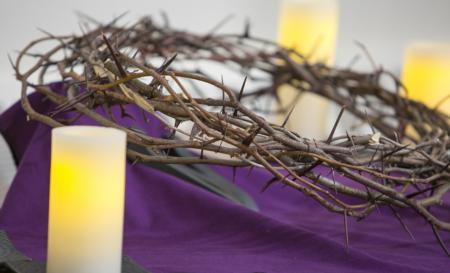Triduum invites us 'to follow the footsteps of Christ'
As the end of the 40 days of Lenten observance approaches, the Church prepares herself to participate in the final three days before Easter -- the Paschal Triduum.
"Triduum means 'three days' which are Holy Thursday, Good Friday and Holy Saturday," explained Msgr. James Mongelluzzo, professor of liturgy at Pope St. John XXIII National Seminary in Weston. "And so we are invited to follow the footsteps of Christ at the final moments of his life."
Beginning with Holy Thursday, the Church celebrates a series of liturgies aimed at deepening our faith, he said.
The liturgy on Holy Thursday commemorates the institution of the Eucharist in the Last Supper, where Jesus not only breaks bread with the disciples, he also washes their feet, and commands them to do likewise.
"This is a great example of Jesus teaching us how to serve others," Msgr. Mongelluzzo said. "It is a sacrament of charity. It is a sacrament of service."
On Good Friday, "there are many great devotions that are encouraged, but the only liturgy is the Liturgy of the Lord's Passion," he explained. Msgr. Mongelluzzo acknowledged that although many parishes change the hour of this liturgy in order to accommodate their parishioners. The preferable time to celebrate this liturgy is 3 p.m. "because in the Gospel it is described as the hour in which Christ gave His life."
"This liturgy reminds us that Christ gave His whole life for us. He knowingly allowed himself to be murdered for our sake," he said.
"And through our baptism we are invited to participate in the death and resurrection of Christ," he continued. "To be servants of one another...to really be folks that reach out to one another."
In addition to the liturgy, Msgr. Mongelluzzo noted that Good Friday is a day of fasting and abstinence. The rule of fasting applies to those ages 18-59 and on fast days one should consume one regular meal and two smaller meals that combined do not equal another meal. Abstinence is to refrain from eating meat and applies to those age 14 and older.
By not eating meat, and by not eating regular meals but curtailing our appetite, the faithful "come into connection with our hunger," he said, adding that "hunger itself leads us to realize our deeper hunger -- the hunger we have for God." He added that adults receiving baptism are also encouraged to continue the fast throughout Holy Saturday before being baptised at the Easter Vigil.
Perhaps the most fundamental liturgy celebrated by the Church during the Triduum is the Easter Vigil, celebrated on the evening of Holy Saturday.
"It should begin when it's dark," explained Msgr. Mongelluzzo. "Darkness is a sign of the world in sin, not knowing right from wrong."
The Easter Vigil begins in the dark, with the Liturgy of the New Fire, he said, whose opening prayer signifies its deeper meaning: "May the light of Christ rising in glory dispel the darkness of our minds and hearts."
The Paschal candle is then lit, and from it every person lights their individual taper.
"It symbolizes that we receive the light of Christ into our own lives."
It is during the Easter Vigil that catechumens who have completed the RCIA program receive the three sacraments of initiation: baptism, confirmation and communion.
Msgr. Mongelluzzo noted that participating in the Paschal Triduum helps Catholics to live out our faith.
"This is when Jesus fulfilled the most important event of His life, one that changed history forever," he added. "Through our baptism, we are invited to truly partake in the death and resurrection of Christ."



















